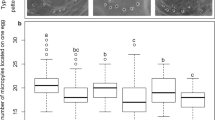Abstract
MALE sterility in Lathyrus odoratus L. was first recorded by Bateson, Saunders and Punnett1. Male sterility was absolute and was inherited as a single recessive gene linked to light axil and cretin2. Fabergé3 and Upcott4 reported that the sterility resulted from disturbances in the meiotic division following normal metaphase pairing. Such plants were normal and fully fertile on the female side.
This is a preview of subscription content, access via your institution
Access options
Subscribe to this journal
Receive 51 print issues and online access
$199.00 per year
only $3.90 per issue
Buy this article
- Purchase on Springer Link
- Instant access to full article PDF
Prices may be subject to local taxes which are calculated during checkout
Similar content being viewed by others
References
Bateson, W., Saunders, E. R., and Punnett, R. C., Rep. Evolution Comm. Roy. Soc., 2, 88 (1905).
Punnett, R. C., “Bibliogr. Gen.”, 1, 69 (1925).
Fabergé, A. C., Genetica, 19, 423 (1937).
Upcott, M. P., Cytologia (Fujii Jub. vol.), 299 (1937).
Blakeslee, et al., Cytologia, 6, 19 (1934).
Author information
Authors and Affiliations
Rights and permissions
About this article
Cite this article
ELLIS, J., BURTON, M. Sterility in Lathyrus odoratus L.. Nature 184, 204–205 (1959). https://doi.org/10.1038/184204a0
Issue Date:
DOI: https://doi.org/10.1038/184204a0
Comments
By submitting a comment you agree to abide by our Terms and Community Guidelines. If you find something abusive or that does not comply with our terms or guidelines please flag it as inappropriate.



